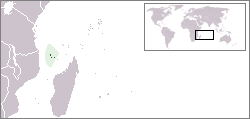Comoros
The Comoros (Arabic: جزر القمر Juzur al-Qumur) are an island nation off the coast of East Africa, in the Indian Ocean between northern Mozambique and northern Madagascar.
Islands
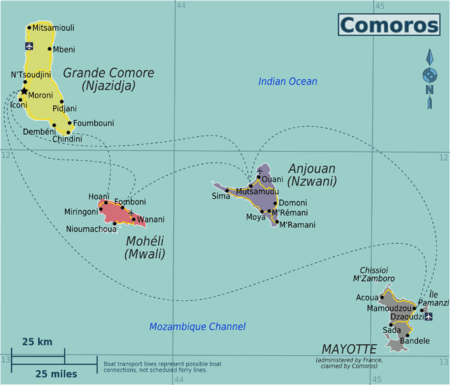
| Grand Comore (Ngazidja) The largest of the islands, holds the Comorian capital (Moroni) and the highest peak (active volcano Karthala). |
| Moheli (Mwali) The smallest and most natural, with the best beaches and unique wildlife, like sea turtles or the huge Livingstone's fruit bat. |
| Anjouan (Nzwani) The most mountainous, also known as Isle of Perfumes due to the number of aromatic plants, such as vanilla and ylang-ylang. |
Cities
Other destinations
- Mount Karthala — an active volcano and the highest peak in Comoros, famous for its crater.
All of the islands have many beautiful beach destinations, being Moheli the one that offers the best nature and water sports opportunities.
Understand
One of the world's poorest countries, Comoros is made up of three islands that have inadequate transportation links, a young and rapidly increasing population, and few natural resources.
Comoros is also the smallest nation in the Arab World by population.
The name Comoros originates from qamar, Arabic for moon.
Climate
Located just south of the equator, the Comoros Islands have a tropical maritime climate, characterized by two seasons according to rainfall. The best season to visit the Comoros is between May and November, during the dry season when the climate is cool and relatively dry, while from December to April is hot and humid. The maximum temperature may vary between 31ºC in December and 27ºC in August, while the average minimum vary between 23ºC in February and 19ºC in July.
Landscape
Volcanic islands whose interiors vary from steep mountains to low hills, with the highest point, Le Karthala (on Grand Comore), at 2,361m.
History
The islands of Comoros have been settled by a succession of diverse groups from the coast of Africa, Persian Gulf, Malay Archipelago and Madagascar. Swahili settlers first reached the islands as part of the great Bantu expansion that took place throughout the first millennium.
In 933 CE, Al-Masudi refers to Omani sailors, who call the Comoros "The Perfume Islands" and sing of waves that break rhythmically along broad, pearl-sand beaches, the light breezes scented with ylang-ylang, a component to many perfumes.
From the 11th to 15th centuries, trade with the island of Madagascar and merchants from the Middle East flourished, smaller villages emerged, and existing towns expanded.
Portuguese explorers visited the islands of the archipelago in 1505 on the Cape Route. By 1506, the Portuguese landed on the islands and began to challenge the Bajas (Bantu Muslim chiefs) and Fanis (lesser chiefs).
The French started to colonize the islands in 1841, ultimately gaining full control of all the islands in 1908.
In 1973, France agreed to give the islands independence, depending on the results of referenda on each island. Grand Comore, Moheli and Anjouan all voted overwhelmingly in favor, but Mayotte voted to remain part of France and has therefore remained under French control.
Comoros has endured 20 coups or attempted coups since gaining independence from France in 1975. In 1997, the islands of Anjouan and Moheli declared independence from Comoros. In 1999, military chief Col. Azali seized power. He pledged to resolve the secessionist crisis through a confederal arrangement named the 2000 Fomboni Accord. In December 2001, voters approved a new constitution and presidential elections took place in the spring of 2002. Each island in the archipelago elected its own president and a new union president took office in May 2002.
Talk
The official languages are French and Arabic. Most Comorians speak their own language known as Shikomor (Comorian), which is a group of Swahili dialects, as a first language and French as a second. Some can also speak Arabic.
Finding a fluent English speaker is a very rare occurrence. However, an educated person will know a few words in English. Your best bet would be to learn French which has a strong influence on media, education and business.
Each island has its own dialect. The greetings below are not necessarily direct translations.
Greetings nearly always follow this pattern:
Grand Comore
- Yedje? (How are you?), response: Ndjema (good)
- Bariza? (News?), response: Ndjema
- Mahabari (News?), response: Salimina (peaceful)
- Hufanyiha dje? (How are you?), response: Ndjema
- Na kozazidi? (And problems?), response: Raha (Not yet)
- E ngawe mnono? (Your health?), response: Alhamdulilah (Thanks to Allah)
Moheli
- Jeje? (how are you?)
- Ndjema (good)
- Gushindu? (your health is good?)
- Ewa (yes)
- Kumnono? (you feel good?)
- Ewa (yes)
- Habari (you are well?)
- Salaama (at peace)
Any series of words with habari in it requires a response of salaama. Shikomor has various extensions of the habari greeting to indicate time of day, such as habarizaho or habarizasobwuhi.
Other necessary words:
- Ewa (yes)
- A-a (no)
- Marahaba (thank you)
- Marahaba menji (thank you very much)
- Swamahani (Sorry/pardon me)
- Pvapvo (there; used to tell a taxi driver where you want them to stop)
- Pvano (here; same as above, but the driver will likely slam on the brakes)
Get in
Everyone requires a visa to visit to the Comoros, which is issued on arrival. A normal visa costs €61. It can be paid in Comorian francs, US dollars, British pounds or Euros. A visa lasts 45 days, and whilst it can be extended the authorities are not likely to unless you have a good reason. All visitors must report to the immigration office in Moroni or Mutsamudu for an additional passport stamp. Failure to do so will lead to problems upon departure.
As of November 2018, Comoros visa is issued on arrival at Moroni airport. Price is €30 or 50 USD paid in cash. Have the exact amount in cash, because change might not be given. Also, there are no ATMs or currency exchange offices in or around the airport, so have the cash for a visa before arrival. You will have to write down a place of residence in Comoros during your stay in the immigration form, however this is not checked.
After immigration, your luggage might be searched however it looked that interrogation by security officers was genuine and not seeking for bribes.
By plane
- Kenya Airways now flies direct from Nairobi, thrice a week, connecting with London, Dubai, Mumbai and Paris flights
- Ethiopian Airlines flies daily direct from Addis Ababa via Dar es Salaam connecting with 100+ destinations around the world
- Air Austral flies from Paris and Marseilles with change of planes in Saint Denis, Reunion
- Inter Iles Air flies from Mayotte to Anjouan and Moroni several times a week.
- Yemenia Airways fly on 4 days each week to Sana'a, Yemen with onward connection to all major cities.
- African Express connects to Mombasa, Dubai.
- Precision Air flies from Tanzania three times a week
- Air Madagascar flies almost daily from Madagascar
By boat
There are freighters that leave from Zanzibar or Dar es Salaam (in Tanzania) and Madagascar. These are cheaper than flying, usually, but take longer and departure dates are less reliable. To catch these you must find the boat captain at the harbour and discuss prices. If you bargain very hard, you may get passage for €100.
Get around

By plane
Inter Iles Air flies between Moroni, Anjouan, and Moheli daily. In Moroni their office is near the Volo Volo Market.
By car
It's possible to rent cars on Grand Comore for approximately CF15,000 to CF25.000 (€30 to €50) a day, depending on the type of car. In Moheli there are no rental agencies, but still you might try to rent a car or motorbike directly to a local with the help of your hotel. Petrol price varies from island to island. While you may pay CF600 (€1.2) per litre in Grand Comore, the price in Moheli (where petrol is scarce) can rise up to CF1000 (€2) per litre.
Each island has a mainroad around the island. Road conditions can be really bad on certain sections, but still doable by regular vehicles without 4WD.
Hitch-hiking is a very common practice among locals, specially in Moheli were there are fewer transportation options. If you look like a tourist, some fee may be requested. As the locals have no access to public transport and children have to walk to and from school, tourists with a car may wish to consider aiding hitch-hikers.
By public transport
Each capital is connected by bus with the villages on their respective island main road. Buses are usually packed, have no fixed schedule and stop running well before sunset.
Shared taxis are the most common mode of public transport within cities.
By boat
Speedboats operate from Chindini on the southern coast of Grand Comore, to Hoani on the northern coast of Moheli. These boats are small fibreglass fishing boats with boat and engines in variable condition. They should be taken only on days when the sea is calm, as passengers have been forced to off-load baggage into the sea and there are rumours boats being lost. However, these boats are generally safe to take on calm days. It is anyway always wise to ask for a life vest. Boats depart from Chindini every morning and the trip takes about one hour. The price is CF10.000 (€20) as of November 2008, plus an additional CF500 council departure tax. Some tourists have been requested a special permit from the police.
Cargo vessels covering the route between the three island's capitals also accept passengers. You'll have to ask at the port or find an agency, and expect longer travel times (up to 12 hours from Moroni to Moheli). The price from Moroni to Fomboni in Moheli is CF10,000 per person.
The company Maria Galanta operates the route Moroni—Moutsamoudou (Anjouan)—Dzaoudzi (Mayotte) twice per week. As of October 2018, the boat leaves from Moroni Thursdays and Sundays, and return trip is Wednesdays and Saturdays. Duration of each leg is 5 hours. The price to Anjouan is €36 one way, and €140-158 all the way to Mayotte. Maximum baggage allowance is 20 kg plus 10 kg of hand baggage.
See
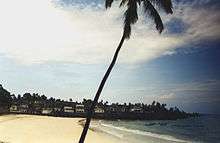
- Lac Sale — lake adjacent to the beach on the north end of Grand Comore. There is a track around and down to the lake
- Dolphins off the coast beyond Hahaya
- Livingstone Bats at Moheli
- Giant Sea Turtles laying eggs at Moheli
- Swahili-inspired architecture with arcades
- White sand beaches. One being Mitsamiouli beach. Lovely white sand beach as from honeymoon postcard picture. However both male and female are expected to wear long trousers and t-shirts even when swimming but this is not enforced
- Moroni old mosque and medina next to it famous for its narrow streets and maze-like architecture.
Do
- Treks such as the Karthala volcano crater (8 hours walk one way). Guides available for €100. This is possible to do as a one long day hike for €60 or overnight at a basecamp which is 5-8 tinplated sheds settlement
- Cycling
- Deep sea diving, snorkelling
- Sailing on a dhow
Buy
Money
|
Exchange rates for Comorian franc As of January 2019:
Exchange rates fluctuate. Current rates for these and other currencies are available from XE.com |
The country's currency is the Comorian franc, denoted by the symbol "CF" (ISO code: KMF). Often, tourists will be given the price also in euros, even if just for reference. In those cases, an invariable exchange rate of €1=CF500 is used.
As of 2018 November, it is best to bring Euro notes to the island. They can be exchanged at most shops for slightly better than the official rate (€1 = 500 francs). Note that a barely noticeable torn banknotes won't be exchanged. There are four ATM located in Moroni at roughly same bank area. Most were declining debit card Mastercard issued in the UK for no apparent reason even logo on the machine stated that it accepts the card type. One bank was charging about 10% of total withdrawing amount as transaction fees. Therefore it's the most cost efficient to bring cash in Euro. Other hard currency might be exchanged at Bureau de change.
Shopping

Handicrafts are not usually of good quality, though women of Mayotte as well as a few women in Grand Comore make quality baskets. One can buy CDs, colourful cloths that women wear (CF500 for a numbawani and CF750 for a finer shawl), beautiful scarves (CF2,000) and other imports.
Most handicrafts and tourist curios for sale at Volo Volo market in Moroni are made in Madagascar, and sold by Malagasy expatriates in the market. Local crafts are hard to find, but some are available at CNAC in Itsandra. Unique Comorian gifts can be found in other parts of Volo Volo market. Consider locally grown spices and essential oils, home made lamps and vegetable peelers, or products made from coconuts.
Do not buy shells from vendors on the beach.
Costs
Because the Comoros are isolated islands, prices tend to be more expensive than the rest of East Africa. The cheapest hotels or bungalows in Moroni (the most expensive lodging region of the Comoros) may cost €20 or as little as €10 if you bargain hard. On the other hand, Hotel Moroni may cost hundreds. Imported goods are cheaper on Grand Comore than Moheli, but fruits and vegetables are cheaper, if less available, on Moheli. Meals in a brochetterie (cheap restaurant that serves fried meat and bananas, manioc, taro, or breadfruit) may cost up to CF1500 (€3) on Grand Comore and as little as KMF250 (€0.50) on Moheli. Cakes (sweet bread) sold by women on the street generally cost around CF50-100 each. One could get by on around CF6,000-10,000 (€12-20) per day for food and lodging.
Eat
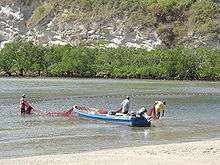
Visitors are advised not to eat any of the local food unless it has been cooked through. One speciality available on the island is the jackfruit, a large, green fruit (about 50 cm in length) with a taste resembling lychee.
As for a small island country surrounded by the Ocean, fish and seafood is the main quality food source for Comorians. Men sail away from the island early morning in boats to come back before dusk with a fish to sell.
Interesting food itinerary would be to observe men coming back from the sea with their catches. This is next to a harbour. Many locals are already hanging around there to buy fish, meet friends and just pass time. Sometimes fisherman returns with a bigger fishes for example swordfish. Later go to Volo Volo market to see the same fish being sold and butchered. As a conclusion to the trip, visit local restaurants throughout the city to taste sea goods. Daily menu will vary depending on the catch of the day.
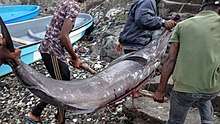

Drink
Alcohol is readily available in Moroni from Indian and Chinese merchants near Volo Volo. Castle beer from South Africa and cheap boxed wine from France are common. Most merchants will supply black plastic bags so that no one will notice you bought alcohol... except that they only give black bags to customers buying alcohol.
European restaurants also serve alcohol.
Sleep
In a pinch, you can probably find a friendly local who will welcome you into their home for the night. Ask if they prefer you to pay them for food and/or lodging. Sometimes people are welcoming you as an honoured guest and consequently it would be odd to pay.
- Karthala International Hotel, Moroni, ☎ +269 763 5212. Check-in: 14:00, check-out: 11:00. USD60.
- Itsandra Beach Hotel, ☎ +269 773 3333.
Learn
Learning facilities on the islands, like most facilities, are underdeveloped. There are several schools on the island of Grand Comore, and one college. These are all severely lacking in resources and funding.
Work
By some reckoning, this is the third poorest country in the world and workers can expect to earn only about USD1-1.5 a day for basic employment.
Stay safe

Comoros is a really safe country. You will feel safe walking on your own on an empty street late at night, even if you are a woman. Being a Muslim country, it is very unlikely that you will suffer any kind of theft. As pavements and city lights are scarce, take caution if you are walking on the road side, especially on weekend nights.
The political situation can be tense, especially in Anjouan island, where the are clashes between rebel and African Union forces. Some state that a civil war is possible. In October 2018, not long after the celebration of a referendum that reinforced the power of the president, Moutsamoudou suffered a week-long period of strike and revolts that ended with several dead.
Cyclones possible during rainy season (December to April).
Le Kartala on Grand Comore is an active volcano.
Stay healthy
Malaria, including cerebral malaria, is prevalent in the Comoros. Sleep under a permethrin-treated mosquito net and take an anti-malarial. Grand Comore and Anjouan have the best medical infrastructure and you can be tested for malaria in most major towns. If you get a fever, it is wise to get tested, especially if the fever does not respond to paracetamol or does not go away. Moheli has a hospital in Fomboni. The one in Nioumachoua may occasionally be accessible.
Healthy food is not difficult to find. Eat many fruits and vegetables as well as rice. During some time of the year vegetables might be only available in small quantities in Moheli. A healthy and delicious local dish is madaba; pounded and boiled manioc leaves. But madaba takes hours to prepare, so you may not find it in restaurants. If you are fortunate enough to stay or eat with a local family, you might get to try madaba. Vegetarians should be aware that on Grand Comore locals put fish in the madaba, while on Moheli they do not. Women may experience cessation or alteration of their menstrual cycle due to poor nutrition if they stay in the Comoros for several months or longer.
Tap water is drinkable according to the National Tourism Office.
Respect
|
Ramadan Ramadan is the 9th and holiest month in the Islamic calendar and lasts 29–30 days. Muslims fast every day for its duration and most restaurants will be closed until the fast breaks at dusk. Nothing (including water and cigarettes) is supposed to pass through the lips from dawn to sunset. Non-Muslims are exempt from this, but should still refrain from eating or drinking in public as this is considered very impolite. Working hours are decreased as well in the corporate world. Exact dates of Ramadan depend on local astronomical observations and may vary somewhat from country to country. Ramadan concludes with the festival of Eid al-Fitr, which may last several days, usually three in most countries.
If you're planning to travel to Comoros during Ramadan, consider reading Travelling during Ramadan. |
Although the Comoros is a rather liberal Muslim country, it is disrespectful for women to expose their shoulders, much of their chest, knees, and especially stomach and lower back. Wear shirts or shawls that cover these areas. Locals will not expect foreign, non-Muslim women to cover their heads. When swimming, local women are fully dressed. Foreigners are not expected to do this, but shorts and a swimming shirt is more respectful than a bikini or topless swimming. Men should wear shorts below the knee, though a man wearing shorter shorts is less offensive than a woman doing so. Public affection between men and women is not acceptable, though one may rarely see a Comorian man and woman holding hands briefly (in the nightclubs some locals seem to ignore Muslim convention).
Non-Muslim religious proselytizing is illegal, as is giving Bibles to locals. Locals are very tolerant and friendly towards non-Muslims, but avoid appearing as if you are trying to convert them.
Drinking alcohol in public is disrespectful, though it occurs in nightclubs. Restaurants generally do not serve alcohol unless they cater to foreigners.
To greet an elder, you say "kwesi". The elder says something like "mbona, mkana baraka" to which you respond "salaama".
It is a big mistake to hand out sweets to children on the street. Since locals are unused to tourists, this rarely occurs and they are usually just happy to talk with you, children included. Once tourists begin handing out gifts and money, locals will see Westerners as rich and free with money, destroying many opportunities for a human connection with them. Children will harass tourists for sweets and money. Tourists who do this are showing themselves to be disrespectful of locals, such as by assuming that money/sweets is what they want from tourists and by putting that in between them rather than making an effort to get to know locals, and ignorant of the consequences of their actions.
Since, allegedly, it was discovered that a Western man, resident of Grand Comore for 14 years, had been making pornographic videos and photographs, as well as violating children on the islands, the residents are quite averse to being filmed or photographed. Individual reactions may vary upon being photographed, but taking unauthorised photographs of the locals will, at best, offend an individual and can potentially lead to violent reactions by the subject.
